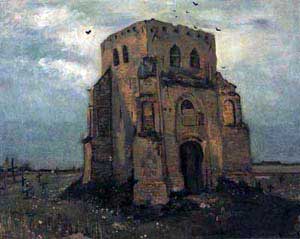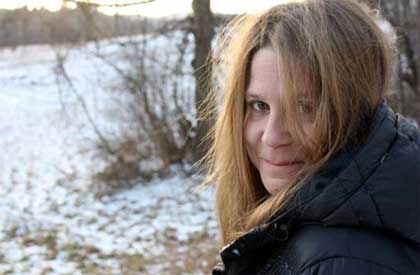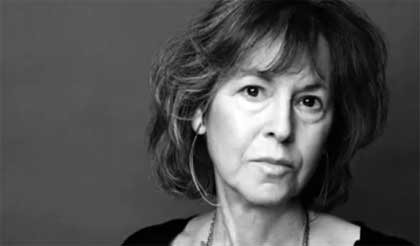Poetry Reading
Woodberry Poetry Room Reading Series
Houghton Library, Harvard University
Cambridge, MA

“Old Cemetery Tower at Nuenen” (1885)
van Gogh Museum, Amsterdam

Photo: The Poetry Foundation
Katie Peterson, who has taught at Deep Springs College in California, one of the most curious campuses in the country, started her reading with, appropriately, a poem called Spring. It began with I have been trying to read King Lear and interleaved that with a partner trying to read Tess of the d’Urbervilles, a sweet and funny knotting of prospective literary engagements.
Peterson read a number of poems from her collection The Accounts, which she identified as a book largely about grief and disorientation.
Eulogy is a beautiful tracing of the last four days of her mother’s life, evocative and direct.
From This House That House is, according to Peterson, about disorientation in various forms, but I found it a wonderful treatment of perspectivalism. The line From California, Massachusetts looks like earth introduces a series of observations about how things look from one end of things or another, wittily aggregated.
Provisioning, according to Peterson, is a combination of a love poem and a landscape poem. In this lovely, elegiac poem about a California road trip in rugged country, the two themes run in parallel almost transparently. I know your forehead and your cheekbone by the argument they make almost seems an observation of geological terrain when Peterson paints it alongside her description of rough roads in California back country, and vice versa.

Photo: The Poetry Foundation
Louise Glück began her part by saying how much she does not like reading her poems; she did a perfectly adequate job nonetheless.
Glück read poems from a new collection, Faithful and Virtuous Night, in which a long monologue is woven in with the lyrical and the prose poems.
Parable begins with Where should we travel? and follows it with other insistent, but not irrelevant, questions. Should we have a purpose? Eloquently, the poems moves into the realm of allegory, following the transition like a kind of travelogue but with a metaphysical tinge. Periodically we seemed to have achieved an agreement the poem eventually assesses, as it follows its sweet logic of subtly veiled redirection, with hints of history and truth seeking peering out from behind its visors.
An Adventure stoically states I am finished with amorous adventures to which I had been a slave, travels soon into a related judgment about poetry, then generalizes: these farewells are the way of things. Heroically, but wryly, it ends: I became a glorious knight riding into the setting sun… And my heart the steed beneath me. Stirring.
A Sharply Worded Silence, written, presumably after, or about, a sad love affair, weaves together a wonderful vision of sitting in a place in Italy simply referred to as the “Contessa’s Garden,” describes an encounter of two women in conversation, with poignant recollections included: my mother used to speak to me in sharply worded silences, crystallizing the memory behind the title.
Aboriginal Landscape begins You are stepping on your father, which leaves an intentionally creepy, ambiguous sense of what this might mean. The scene turns out to be set in a graveyard, which momentarily clarifies things. But then the poem traverses the graves of many fathers and mothers and we come to in a dreamscape. Then there is a conductor – not sure if train or orchestral – who declares I was like you once, in love with turbulence and This is my home, the city where I disappear – a beautiful, perplexing, conglomeration of images, powerfully connected by travel and by alienation.
A Work of Fiction ended the reading, asking Where have they all gone these people who have seemed so real?, and in grave response, I lit a cigarette, each breath patiently destroying me. Powerful, unsettling and vivid, difficult to read aloud indeed.
– BADMan
Leave a Reply